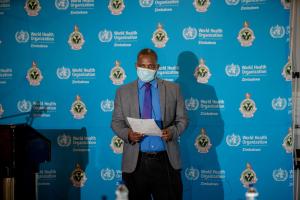Government of Zimbabwe joins the rest of the world to commemorate World Health Day
7 April 2022 - Today, The Ministry of Health and Child Care (MoHCC) joins the rest of the world to mark World Health Day 2022. This year’s theme “Our planet: Our health” advocates for global attention on urgent actions needed to keep humans and the planet healthy and foster a movement to create societies focused on well-being.
Climate change is the single biggest health threat facing humanity contributing to environmental risks that are killing around 13 million people every year. Zimbabwe has not been spared from the devastating impacts of climate change with heavy rainfalls, characterized by floods and cyclones as well as droughts.
“Climate Change has the potential to stall the country’s development, pose a serious risk to food security, health, and adaptive capacity. Our government has shown its commitment to address climate change through our National Climate Change Response Strategy (NCCRS) which seeks to establish specific provisions for dealing with climate changes issues, understanding the extent of the threat, and putting in place specific actions to manage potential impacts. In addition, our commitment to develop a climate-resilient Zimbabwe has also been demonstrated by the elevation of the Climate Change Office into a fully-fledged Climate Change Department,” noted Honorable, Deputy Minister of Health and Child Care Dr. John Mangwiro.
According to the meteorological services of Zimbabwe, since 1987 the country has experienced its six warmest years on record, with daily minimum and maximum temperatures having risen by approximately 2°C over the past century. This has seen the country experience extremes of weather over the past two decades. We have had to deal with 10 droughts, decreased freshwater and destroyed biodiversity.
“Children are the most vulnerable to the effects if climate change which are becoming more widespread. As extreme weather events such as cyclones, droughts and heat waves increase in frequency and ferocity, I call on the government to create risk-informed policies that place climate resilience at the center of national strategies,” said UNICEF Representative, Dr. Tajudeen Oyewale.
Due to climate change, Zimbabwe experienced Cyclone Idai in 2019 which affected more than 270 000 people leaving over 341 people having lost their lives, and massive destruction of infrastructure which include clinics, hospitals, schools amongst others. The country also suffered the tropical cyclones Ana amongst other climate shocks, signaling an urgent need for all stakeholders to start conversations around climate change as well as mitigation plans.
In Zimbabwe, if not mitigated climate change will cause average temperatures to rise by about 3°C before the end of this century. Annual rainfall could decline by between 5% and 18%, especially in the south. Rainfall will become more variable. There will be an increase in droughts, floods and storms. This will affect Zimbabwe’s food Climate Change in Zimbabwe security, health, energy supply and the economy
“Climate change disproportionately affects the most vulnerable and disadvantaged in communities. We call for accelerated action by leaders and all to preserve and protect health by investigating in mitigation of the climate crisis.,” said WHO Zimbabwe Country Representative Dr Alex Gasasira.
As we think globally, let us act locally. Each one of us needs to play our part on reducing factors contributing to climate change. We can all take basic steps to reduce climate change by;
- Transport: Walk/pedal to work at least one day a week. Choose public transport
- Energy: change to a renewable energy such as solar; don’t heat your rooms over 21.5C, turn off the light when not in the room, save energy.
- Nutrition: Buy your groceries from local producers and avoid ultra-processed food.
- Healthy lifestyles: Tobacco is a killer and a polluter. Stop smoking
For more information contact:
Mr Paul Chinakidzwa, Deputy Director Health Promotion, MoHCC pchinakidzwa [at] gmail.com (pchinakidzwa[at]gmail[dot]com)
Ms Tatenda Ann Chimbwanda, Communications Officer, WHO Zimbabwe chimbwandat [at] who.int (chimbwandat[at]who[dot]int)
Mr Yves Willemot, Chief Communication, UNICEF Zimbabwe, ywillemot [at] unicef.org (ywillemot[at]unicef[dot]org)




